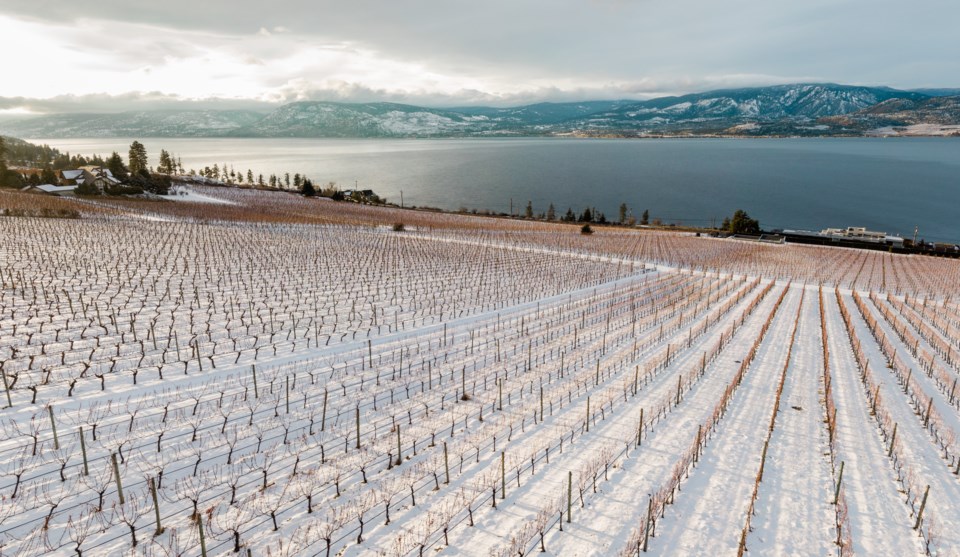For Decoa and Jeff Harder, wine has weaved its way through their relationship and career for more than two decades.
The duo is coming to Whistler Nov. 8 to talk about the impact climate change has on Okanagan wineries, bringing decades of industry experience to the table. Held at the Whistler Conference Centre’s Rainbow Theatre with doors opening at 5:30 p.m., attendees will learn about local and global changes to the wine industry. The event is part of the Whistler Institute’s Global Perspectives Speaker Series and paired with Cornucopia. Attendees can purchase a ticket for the talk or add entrance to Cellar Door after to keep the conversation flowing.
The couple is as lively as you would expect from a pair who have made a career in the wine industry, and their passion for vino is rooted in love for each other and the industry.
A full-bodied love story
The Harders began their careers more than 20 years ago, with Decoa getting her start at Quails' Gate Winery after college which sparked her desire to one day own a winery herself. Jeff’s brother owns multiple wineries in the U.S., and he followed in his footsteps.
The inspiration for naming their former winery came from a trip early in their relationship.
“Being the romantic, Rico Suave guy that I am, I took her into an art gallery in San Francisco, and we came across this beautiful sculpture. It was called ex nihilo,” Jeff said.
While Decoa wandered around and explored the exhibit, Jeff stood enthralled by the sculpture.
“I said to her as we walked away, ‘One day when we own a winery, we're going to call it ex nihilo,’" he said. "It was pretty presumptuous of me because we were only starting to date.”
The name means “from out of nothing,” which epitomized the process of winemaking to Decoa, while Jeff joked that it referred to his pocketbook at the time.
Flash forward to today, and they’ve sold the winery and work as consultants for the industry now trying to make something out of nothing with a changing climate.
Survival of the fittest varietals
Some of their projects include winery receivership for bankrupt vineyards, but bankrupt wineries aren’t their focus. They’re trying to prevent that outcome as consultants with their company, Groupe One Consulting.
“This last couple years of climate challenges are really making it difficult for a lot of wineries to survive,” Decoa explained.
Last winter, temperatures dipped below -20 to -25 C and killed wine crops through the Okanagan Valley, which holds 86 per cent of B.C.’s vineyards, according to the Wine Growers Of British Columbia.
In response, growers have had to make hard decisions with the 2024 vintage, from purchasing grapes elsewhere, to replanting heartier stock.
Decoa estimates through dialogue with the industry that about 30 per cent of B.C. wineries in 2024 will buy fruit from outside the province because of last winter’s deep freeze. Others have enough inventory to carry them through to better years, and some won’t deviate from the B.C.-grown brand they’ve cultivated.
Buying out of province is a break from tradition and regulation. To have an estate winery license that can sell products privately to consumers outside of the B.C. Liquor Distribution Branch (BCLDB) system, estates need to produce wine made from 100-per-cent B.C. grapes., according to Decoa.
Producers in 2024 were given an exemption, allowing purchase of grapes from outside B.C. for this year, and wineries can sell the bottles for the next two years without incurring extra taxes.
The pause in regulation came during a worldwide surplus, making the math work in favour of B.C. wineries.
“Right now, there is a global wine glut, so it is getting cheaper to buy fruit outside of the province,” Decoa said.
Some wineries will fill the gap of local grapes from places like Napa Valley, Washington and Oregon.
While the price may be right, it doesn’t mean a consumer will want to change their purchasing and savouring habits. Jeff said only time will tell if consumers support this shift, but likened it to companies purchasing textiles from outside of Canada and producing them locally.
Aside from purchasing outside the province, growers are looking to adopt crops that suit changing climates, with heartier varietals like Frontenac and Marquette, which survive in -35 C, or Californian growers exploring drought-resistant grapes. Then, there’s grafting well-known grapes to cold-resistant roots.
“Eventually we can have Cabernet Sauvignon that's been grafted with a root stock that is cold-resistant enough, and there is a way to still get our favourite varietals grown locally," Decoa said. "Or, we slowly switch the consumer over to some heartier varietals."
For the full taste of growing wine in the face of climate change, you’ll have to get a ticket to the event.



